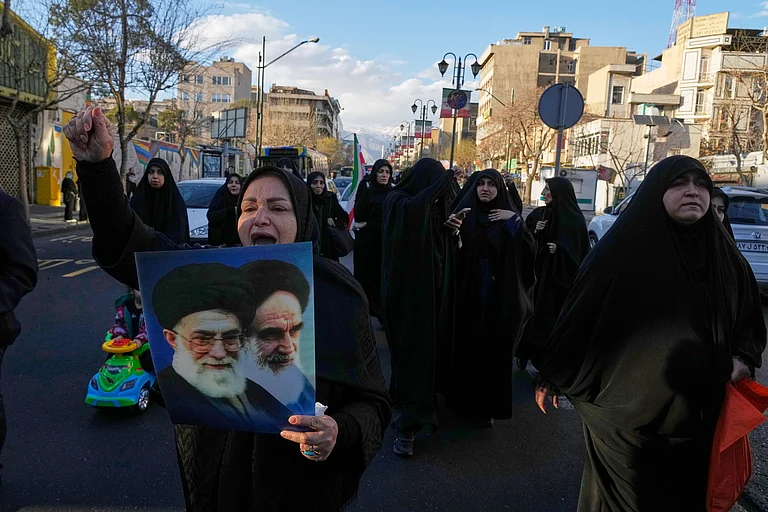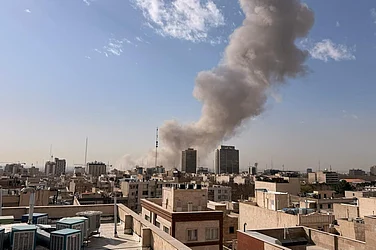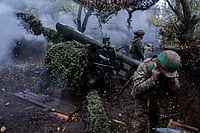In a targeted airstrike on a densely populated neighbourhood of Lebanon's southern Beirut, Israel eliminated Hezbollah's top leader Ibrahim Akil, who had a $7 million bounty on him.
Akil was one among the 31 persons who were reported dead by the Lebanese health officials, who noted that dozens others were injured in the attack.
Rear Adm Daniel Hagari said that the strike on Beirut's southern Dahiya district targeted and killed Ibrahim Akil, a commander of Hezbollah's elite Radwan Force, as well as 10 other operatives of the Lebanon-based group.
The continued attacks from Israel and Hezbollah have increasingly raised the concerns of a full-scale war breaking out in the region, while the one on Gaza is already underway.
Middle East Tensions | The Latest
Top Hezbollah Commander Killed
Israeli army confirmed that its airstrike Beirut's southern Dahiya region killed Hezbollah's top leader Ibrahim Akil along with 10 other operatives of the group.
However, the Israeli military did not provide elaborative details on the identities of the other commanders who were allegedly killed in its strike.
Meanwhile, the Lebanese Health Ministry noted that at 31 people were killed and 68 others injured in the airstrikes.
Hezbollah did not concretely confirm Akil's killing, however, it said that he was supposed to be in the building that was hit in the attack. Akil has been a part of the Lebanese group's highest military body -- the Jihad Council -- and has been sanctioned by the United States for his involvement in two terrorist attacks in 1983 which killed over 300 people at the US Embassy in Beirut and the US Marine Corps barracks.
Notably, the last time Israel hit Beirut in an airstrike was in July and that attack killed Hezbollah commander Fuad Shukr.
Israeli military spokesperson Rear Adm Daniel Hagari also accused Akil of planning a series of attacks against Israeli soldiers and civilians. He also claimed that Akil was the mastermind of a never-realised plan to invade northern Israel in a way similar to Hamas' October 7 attacks.
Last year, the State Department also posted a USD 7 million reward for information leading to Akil's identification, location, arrest, or conviction, adding that he also directed that taking of American And German hostages in Lebanon in the 1980s.
Israel-Hezbollah & The Head-On Strikes
Israel and Hezbollah have been pounding each other with back-to-back strikes, with top officials of both sides making it clear that they wouldn't stop.
Hours before the Israeli airstrike on Beirut, Hezbollah had struck northern Israel with 140 rockets as the region awaited the revenge promised by top leader Hassan Nasrallah over this week's mass bombings through the pagers and walkie-talkies' blasts.
Hezbollah, however, portrayed its heavy bombardment as a response to the previous Israeli attacks on southern Lebanon, and not as a revenge plot for the electronic devices' explosions.
It is notable that as Hezbollah and the rest of the world blamed Israel for the bombings, Tel Aviv kept mum on any involvement in the same. This led to further escalation of tensions between the two sides.
Friday's airstrike on Beirut was one of the deadliest attacks on the neighbourhood since 2006 and it took place during the peak hours, when people were returning home from work and children were leaving from school.
Israeli military spokesperson Rear Adm Daniel Hagari said that "the attack on Lebanon is to protect Israel".
After the strike on Beirut, Hezbollah announced two more attacks on northern Israel, in which, the group claimed that it targeted an intelligence base from where it alleged Israel directed assassinations.
Israel and Hezbollah have been striking each other since the start of the war on Gaza, with Hamas' October 7 attacks. Hezbollah said that its daily strikes on Tel Aviv won't stop till there is a complete end to the Gaza war, adding that its actions were a show of support to its ally -- Hamas.
Since the pagers and walkie-talkie radios used by Hezbollah members detonated this week, killing over 37 people and injuring over 3,000 others, Israel and the Lebanese group have been exchanging continuous rocket barrages.
With both sides vowing to retaliate, the situation remains highly sensitive in the region. Hezbollah leader Hassan Nasrallah's vow to giving severe punishment to the enemy responsible for the attacks, which he termed to be a "severe blow" to the group, have brought Israel on the edge.
Meanwhile, the Israeli Army has ordered residents in the Golan Heights and northern Israel to avoid public gatherings and minimise their movements, asking them to stay close to shelters.
Violation Of International Law, Says UN Rights Chief
United Nations Human Rights chief on Friday said that weaponising ordinary communication devices represents a new development in warfare, adding that targeting thousands of Lebanese people using electronic devices like pagers, walkie-talkies, without their knowledge is a violation of international human rights law.
Addressing an emergency meeting of UN Security Council, Volker Türk said that there must be an independent and transparent investigation of the two attacks in Lebanon. "Those who ordered and carried out these attacks must be held to account," he said.
The UN high commissioner for human rights said the explosions not only violated international human rights law but also appear to violate international humanitarian law's key principles in carrying out attacks -- distinction between civilians and combatants, proportionality, and precautions.
Türk said that international law also prohibits the use of booby-trap devices that look harmless, adding that "it is a war crime to commit violence intended to spread terror among civilians".
“Let me be clear — this method of warfare may be new and unfamiliar,” Türk said, “but international humanitarian and human rights law apply regardless and must be upheld.”























